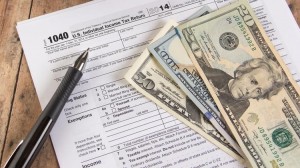Despite a pullback in oil and gas industry jobs, Colorado’s economy is continuing to grow — enough so that state revenues this year will trigger tax refunds in 2016 for Colorado wage earners under the Taxpayer’s Bill of Rights.
The forecast estimates that about $221 million will likely be returned to taxpayers on income tax returns filed for calendar year 2015.
Roughly $83.6 million in refunds will go to people qualifying for the state’s Earned Income Tax Credit and another $137.3 million will be earmarked for all wage earners in the form of a sales tax credit on 2015 returns.
The Colorado Legislative Council forecast projects that the state will finish the current fiscal year on June 30 with about $18.6 million above the state’s required reserve.
“This is the most significant contribution to the economic well-being of low- and moderate-income families in Colorado in decades,” said Ali Mickelson, director of legislative and tax policy for the Colorado Fiscal Institute, a public policy think tank that focuses on issues that primarily affect low and moderate income people.
“More than 350,000 Coloradans will be helped by the state Earned Income Tax Credit. It is truly a historic day.”
The CFI estimates that the average credit under the EITC in Colorado will be about $217 per family. The maximum income to receive the credit would be $53,267 for a family of three or more children, according to the institute.
The federal tax code has had an earned income credit for decades. It’s been popular with liberals and conservatives because it rewards people who are working and claim at least some income on their returns.
Conservatives warned that the forecast isn’t all good news. Rep. Brian DelGrosso, R-Loveland and minority party leader in the Colorado House, said it’s encouraging to see continue improvement in the overall economy.
gas industry has experienced some significant reductions in the last year and this will impact many Colorado regions that are still struggling to recover,” DelGrosso said. “With so much unknown in our future, we must commit to fiscal responsibility and take steps to ensure all of Colorado can continue to move forward.”
The state issues two revenue forecasts per quarter: one prepared by the executive branch’s Office of State Planning and Budgeting and another by the Legislative Council. OSPB economists, while coming up with slightly different numbers, confirmed that state tax revenues are sufficient to trigger the TABOR-mandated refunds.
OSPB economists also noted the pullback in oil and gas industry jobs, but the financials suggest that economic expansion is spreading beyond the northern Front Range which has led the state’s recovery since the recession.
“Housing costs continue to rise as a result of the strong economic expansion, especially in urban areas along the northern Front Range. There are more signs of higher wage growth and the strongest overall job growth in 2014 came from the state’s middle-wage paying industries,” the OSPB forecast said.
The final TABOR refund amounts will become official in November, after the state’s financials are audited and certified.
Some economic development groups have complained that TABOR refunds and other complicating budget mandates are restricting the state’s ability to invest in infrastructure and higher education that can boost overall economic growth.
Both forecasts indicated that state and national economies have pulled back some since the last revenue forecast in March, largely because of declining jobs in the oil and gas industry triggered by historically low petroleum prices.
However, other segments of the economy have grown enough to make up the difference, the forecast suggests. That trend is expected to continue through the end of 2015 but at a somewhat subdued rate of growth.
The labor market in almost all industries except for oil and gas will continue to improve with growth in wages and salaries. State economists warn, however, that a strong U.S. dollar could dampen U.S. exports and coupled with uneven global economic activity and tighter monetary policy from rising interest rates, growth rates will slow.

Leave a Reply